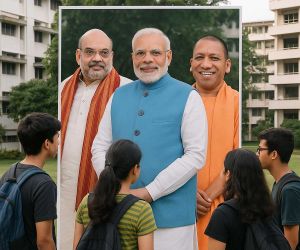MORE COVERAGE
Twitter Coverage
Satyaagrah
Written on
Satyaagrah
Written on
Satyaagrah
Written on
Satyaagrah
Written on
Satyaagrah
Written on
JOIN SATYAAGRAH SOCIAL MEDIA
UK NHS sparks outrage as it defends cousin marriages among British Pakistanis despite Bradford studies linking inbreeding to birth defects, with critics like Patrick Nash and Richard Holden demanding action

The United Kingdom is home to Europe’s largest Pakistani community, numbering over 1.6 million people according to the 2021 Census. Over the years, this figure has grown rapidly. But the country is not just absorbing individuals; it is increasingly engaging with practices, and even criminal elements, carried from abroad. One stark example: grooming gangs, which have operated with apparent impunity for decades in Britain.
|
Still, authorities and sections of the media have often sought to downplay or conceal these offenses under the guise of “liberalism,” apparently to shield themselves from charges of racism. In a continuation of this approach, a new controversy has arisen over how a sensitive issue within the British Pakistani community is being debated.
In a surprising move, the National Health Service (Genomics Education Programme) has offered a defense of “cousin marriage,” a custom widely practiced among Muslims, particularly those of Pakistani descent. The programme claimed that there are possible benefits to the practice. They cited financial advantages — for instance, pooling resources, property, and inheritance rather than splitting them across multiple households — as well as stronger support networks across extended families.
Yet, the same analysis did not ignore the serious risks. It acknowledged that inbreeding raises the likelihood of genetic condition. The programme also referenced a BBC report showing that more babies have been born with certain genetic conditions in Bradford than in many parts of the UK. Bradford is known for having a large British Pakistani population and for a high rate of cousin marriages. That report described how the genetic disease led to the loss of “several children, one after the other.”
Still, the NHS programme objected to attempts to ban cousin marriages. It called the health-based objections an “oversimplification” of the issue and a “stigmatization of certain communities.” It argued that opposing the practice outright would be wrong. The concept of endogamy — marriage within a defined social or cultural group — was also implicated in the defence. Later, the British Society for Genetic Medicine (BSGM) declared that using health concerns as a reason to prohibit the practice was unjustified.
|
Public Backlash and Calls for Apology
The NHS statements triggered a strong backlash across the United Kingdom. Many have demanded that the NHS issue an apology for highlighting benefits of first-cousin marriage, neglecting the well-documented risks of birth defects. The practice is also linked to women’s mistreatment and to a higher chance of genetic disorders in children from such unions.
Dr Patrick Nash, director of the Pharos Foundation’s social science research unit at Oxford and an expert in religious law, condemned the guidance, calling it “truly dismaying.” He was quoted in the Daily Mail as saying:
“Cousin marriage is incest, plain and simple, and needs to be banned with the utmost urgency – there is no ‘balance’ to be struck between this cultural lifestyle choice and the severe public health implications it incurs. This official article is deeply misleading and should be retracted with an apology so that the public is not misled by omission and half-truths.”
Richard Holden, a Conservative MP, also expressed sharp criticism. Speaking to the Daily Mail, he said:
“Our NHS should stop taking the knee to damaging and oppressive cultural practices. The Conservatives want to see an end to cousin marriage as a backdoor to immigration too, but Labour are deaf to these sensible demands.”
He added:
“Sir Keir Starmer should stop running scared of the misogynistic community controllers and their quislings who appear in the form of cultural relativist-obsessed sociology professors, and ban a practice the overwhelming majority, from every community in Britain, want to see ended for good.”
Richard Holden is backing a proposed bill in Parliament to ban first cousins from marrying. He and his supporters emphasize the health cost. Children born to closely related parents are at greater risk of conditions like sickle cell disease or cystic fibrosis, which place a heavy financial burden on the NHS. According to records, in cities such as Sheffield, Glasgow and Birmingham, one in five children with congenital conditions receiving treatment are of Pakistani heritage.
|
|
Evidence of Harm: Reports on British Pakistani Children
Cousin marriage has become a subject of intense scrutiny by medical professionals in the UK and Europe. They warn that the children born of such unions are more likely to suffer health complications. The earlier BBC article focused on disturbing data from Bradford, where the practice is prevalent.
Between 2007 and 2010 (or 2011), researchers involved in the Born in Bradford project enrolled about 13,000 (13,500) infants in that city. They closely monitored these children through childhood, adolescence, and into early adulthood. Among married Pakistani couples, 37% were first cousins.
This study is one of the largest of its kind and has become central to understanding the health impacts of cousin marriage globally. In this study population, one in six children had parents who were first cousins, primarily from Bradford’s Pakistani community.
The findings were striking. The researchers showed that first-cousin parentage can have more consequences than previously thought. The most evident risk is a recessive condition (like sickle cell disease or cystic fibrosis). When both parents carry a recessive gene, there is a one in four chance the child will inherit that condition. Because relatives are more likely to share genes, the odds rise. While in the general population the risk is about 3%, children born to first cousins face a 6% chance of having a recessive disease.
Beyond obvious genetic disorders, the study examined other metrics: children’s speech and language development, how often they visited medical services, and their educational performance. After adjusting for factors like poverty, they found that a child of first cousins in Bradford had an 11% chance of needing a speech or language diagnosis, versus 7% for children whose parents were unrelated.
They also measured developmental milestones: the probability that a child would reach a “good stage of development” by age five (an official measure used in England). For children of first cousins, this chance was 54%, compared to 64% for children with unrelated parents.
Additionally, children from first-cousin unions made more visits to primary care. On average, these children needed one third more medical appointments each year compared to children whose parents were not related. The data even suggest that consanguinity (genetic closeness) may affect health outcomes in children without a diagnosable recessive disorder, once known cases are excluded.
Harms of Inbreeding, Birth Defects, and More
Congenital abnormalities, as noted before, lead to severe consequences such as stillbirths and infant deaths. In the Born in Bradford study, 386 congenital abnormalities were confirmed during the same period among children of 11,396 mothers in the study. Consanguineous marriage—marriage between blood relatives—emerged as a significant risk factor for these defects, even after adjusting for socioeconomic deprivation. For couples not related by blood (across all ethnic groups), the defect rate was 2.5%, while for first cousins it climbed to 6.5%. This corresponded to a multivariate risk ratio of 2.19 (confidence interval 1.67–2.85).
Beyond ordinary birth defects, cousin and similar marriages have been linked to more extreme genetic conditions. One such rare outcome is Uner Tan syndrome (UTS), in which affected individuals walk on all fours and often face severe cognitive impairments. Some describe it as “reverse evolution.” The case famously surfaced in the Ulas family in Turkey: four sisters and a brother were observed walking quadrupedally, and a sixth relative who bore the trait died young. A 2006 BBC documentary first brought their story into public view.
A study from Liverpool University found these children had unusually small cerebella (a brain region) and skeletons that more closely resembled apes than humans. The condition was tied to intrafamilial marriage and reproduction, reinforcing that the syndrome is an autosomal recessive illness—meaning both parents must carry the gene variant to pass it on.
|
|
Public Voices and Defensive Claims in British Pakistani Communities
British activist Tommy Robinson addressed this matter in a July video. He argued that 33% of birth defects in the UK are caused by British Pakistanis, who make up about 3% of the population, and claimed 76% of Pakistanis in Bradford marry their first cousins. He argued that the cultural norm burdens the UK health system significantly.
In response, many British Pakistanis strongly defended intrafamilial marriage. One couple told the BBC:
“That’s God’s will, nobody can say anything about that. Even if you marry outside the family, it could still happen. So many people have married outside the families and they may still have a child with a disability.”
They dismissed genetic risks, asserting that marriage outside the family also carries risk. Another Muslim individual pointed out that first-cousin marriage is common in Pakistan or India, considering the large Muslim populations there.
According to a 2021 study, about 55% of British Pakistanis marry first cousins. These unions represent roughly 3% of all marriages in the UK. The practice is especially widespread in places like Birmingham, which has a sizable British Pakistani population.
|
“Home Base” of Cousin Marriages
Cousin marriages and related inbreeding practices are deeply rooted in many Islamic societies. Recent data show that Pakistan leads globally, with a 61.2% rate of consanguinity, followed by countries such as Kuwait, Qatar, the United Arab Emirates, and Sudan. Despite mounting evidence of harm, the practice remains prevalent in many Muslim-majority areas.
Key Statistics from World Population and Genetic Studies
These practices have contributed to an unusually high burden of genetic disorders among children. A 2022 DW study noted the link between cousin marriages and health problems in children across Pakistan. A 2013 investigation titled “Key factors in understanding differences in rates of birth defects identified”, carried out by the University of Leeds and the University of Bradford, concluded that consanguineous marriages accounted for up to 77% of congenital disabilities in children in certain regions.
In Pakistan, research by Zafar Iqbal, in “Identifying Genes Responsible for Intellectual Disability in Consanguineous Families,” showed that the country’s consanguinity rate exceeds 60%. He also noted that first cousins represent 17% to 38% of all consanguineous marriages in Pakistan. The study emphasized that if children survive infancy, they still face high odds of genetic issues or chronic illnesses.
A Pakistani genetic mutation database, maintained by institutions such as Kohat University of Science & Technology, monitors and tracks mutations and diseases brought about by inbreeding. It has cataloged over 1,000 mutations across 130 distinct genetic illnesses in regions including Kashmir, FATA, Punjab, Khyber Pakhtunkhwa, Balochistan, Sindh, and Gilgit-Baltistan. Among Pakistani children, thalassemia — a blood disorder impairing oxygen transport — is the most common inherited condition.
Conclusion
Cousin marriage remains deeply entrenched in Pakistani Muslim culture—both in their home country and among diaspora communities like those in Britain. Over the years, numerous media stories and scientific studies have drawn attention to the problems this practice poses.
A particularly telling example occurred in 2015, when The Telegraph warned of a startlingly high proportion of birth defects among children born to British Pakistani couples. Back in 2008, media reports estimated that though Pakistani-origin births made up only 3% of UK births, they were responsible for 30% of infants born with recessive genetic anomalies, largely due to the frequency of cousin marriages. In Bradford, 55% of Pakistanis were married to a first cousin.
Yet British institutions, including the state, have often appeared reluctant to challenge these practices. Just as they were accused of downplaying the exploitation of young girls in grooming gang cases, critics argue they now underplay scientific evidence about inbreeding in these communities.
What is most alarming is their apparent prioritization of ideological consistency over children's well-being. Their ongoing willingness to reject or suppress scientific facts—just to uphold what they see as liberal or “woke” ideals—comes at the cost of innocent lives and public health.
 Support Us
Support Us
Satyagraha was born from the heart of our land, with an undying aim to unveil the true essence of Bharat. It seeks to illuminate the hidden tales of our valiant freedom fighters and the rich chronicles that haven't yet sung their complete melody in the mainstream.
While platforms like NDTV and 'The Wire' effortlessly garner funds under the banner of safeguarding democracy, we at Satyagraha walk a different path. Our strength and resonance come from you. In this journey to weave a stronger Bharat, every little contribution amplifies our voice. Let's come together, contribute as you can, and champion the true spirit of our nation.
 |  |  |
| ICICI Bank of Satyaagrah | Razorpay Bank of Satyaagrah | PayPal Bank of Satyaagrah - For International Payments |
If all above doesn't work, then try the LINK below:
Please share the article on other platforms
DISCLAIMER: The author is solely responsible for the views expressed in this article. The author carries the responsibility for citing and/or licensing of images utilized within the text. The website also frequently uses non-commercial images for representational purposes only in line with the article. We are not responsible for the authenticity of such images. If some images have a copyright issue, we request the person/entity to contact us at This email address is being protected from spambots. You need JavaScript enabled to view it. and we will take the necessary actions to resolve the issue.
Related Articles
- National security or victims of Muslim rape gangs are not a priority for UK to avoid “Islamophobia” label as in most Western countries: Convicted pedophile Muslim MP served on government Muslim rape gang panel
- "Sunak, wake up": Hindu families terrorized by Islamists in West Midlands, spine-chilling details of relentless persecution, labeled ‘Kafir,’ but Police deny hate crime citing 'no evidence,' yet a recent case implicates a British Muslim cop in the torment
- London's Trocadero surrenders to the Karma of England's Colonial Past: New Mosque to bring inclusivity, Muslim billionaire Asif Aziz wins permission to turn one of central London's most famous landmarks and entertainment complexes into a mosque
- A 33-year-old Indian Cheistha Kochar, a bright LSE PhD candidate & ex-NITI Aayog employee run over by a truck while cycling back home; despite London's dense CCTV network, the absence of arrests a week on raises pressing questions of Indians safety abroad
- "Victorious warriors win first and then go to war, while defeated warriors go to war first and then seek to win": Rishi Sunak or Liz Truss, conservatives to elect a new leader as British Prime Minister | Truss heavily tipped to win a summer-long contest
- "Fake news thrive because few verify what's real and always bias towards content that reinforces their own biases": Controversial Islamist Majid Freeman, who fanned Leicester riots with fake news, meets Leicester Mayor to peddle more poison against Hindus
- "Women are the twin halves of men": Muslim stabs his wife in the neck 27 times in front of their children ~ Adil Butt’s wife likely had disobeyed him, or he thought she had, and that made her an unbeliever and when you meet unbelievers, strike the necks
- ‘We want our country back’: London erupts as millions of protestors led by Tommy Robinson march with nationalist slogans against migration, backed by Elon Musk and Eric Zemmour, as PM Starmer stays silent
- "We are all born ignorant, but one must work hard to remain stupid": Indian-origin UK Home Secretary Suella Braverman says she has "reservations” about Britain’s trade deal with India as it could increase immigration to UK, claims Indians largest migrants
- "या अल्लाह": Sara Sharif, a 10-year-old from Woking, found dead with severe injuries; her father, Urfan Sharif, confessed to beating her but blamed stepmother Beinash Batool, as forensic evidence and messages revealed abuse, triggering trial at Old Bailey
- "Don't be ashamed of your story — it will inspire others": UK Police watchdog claims it can’t figure out why cops dropped investigation into Muslim rape gangs, the reason is blazingly obvious it was fear of charges of “racism” and “Islamophobia”
- "Don't part with your illusions. When they are gone, you may still exist, but you have ceased to live": Muslim men Rizwan, Mohammed Hansrod, Israfeel, and Zakir convicted for the murder of Abdirahim at Leicester Crown Court, due to be sentenced on 11 Nov
- "Multiculturalism has failed": Amid rising tensions, the UK questions its stance on multiculturalism, Home Secretary Suella Braverman's remarks ignite debate, as the nation reevaluates its migration approach, juggling global duties with domestic peace
- Churchill's Old War Office, once a bastion of British power seized by Indians, behold as karma unfolds, Hinduja Group to transform his last memorial in London into a beacon of luxury, a testament to India's soaring global stature and boundless creativity
- UK Govt dismissed Islamic cleric Qari Asim as ‘Islamophobia adviser’ for campaigning against artistic freedom and supporting protests to cancel ‘blasphemous’ film ‘The Lady of Heaven’ which is based on life of Prophet Muhammad’s daughter Fathima

























